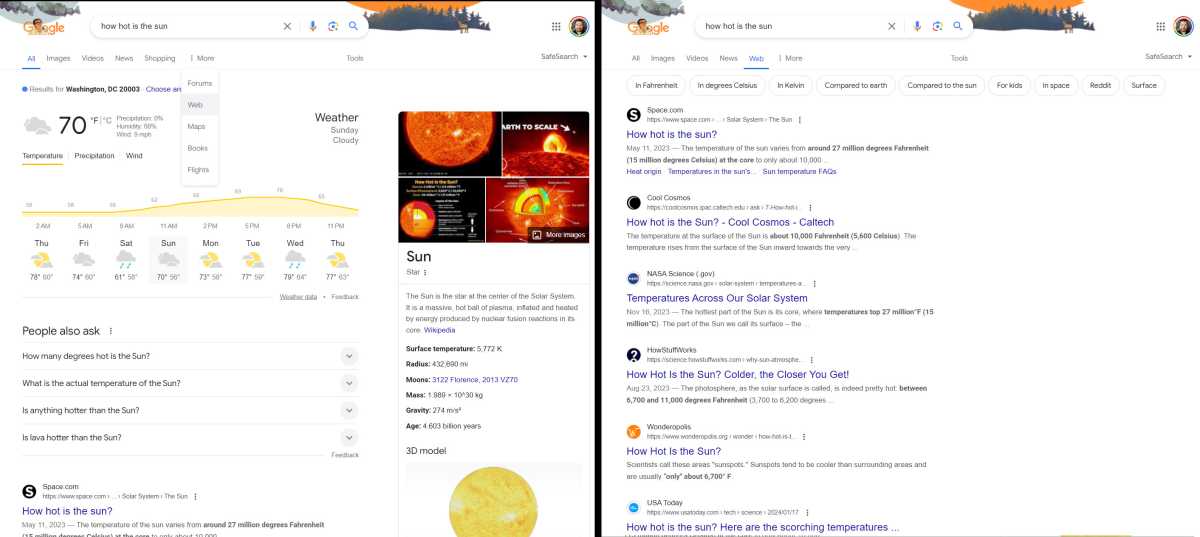
 Image: Google
Image: Google
What’s the first thing you think of when you read the words “web search”? According to market share data, nine out of ten of you would say “Google,” or at least that’s the web search of choice worldwide by a startling 90 percent. Google just rolled out a “Web” search option along with its usual Images, News, Shopping, Maps, etc. tabs. It might just be a big deal.
But wait, isn’t “web search” what you’re supposed to get with a standard Google query, without any need to click on a secondary tab? Yes and no. Google’s official SearchLiason Twitter account explains that the Web tab filters results so that only text-based results will be returned, stripping out images, videos, shopping products, maps, and all the other allegedly helpful modern additions to Google. It’s practically a time machine to when searching the web really did focus on text, without a huge amount of additional context and add-ons.
Crucially, this is also going to strip out a lot of the extras that Google has been building into search in the “All” tab, for reasons both customer-facing and profit-driven. In addition to standard advertising, Google has been sticking more and more modules into search, crowding out conventional text-driven web results. This is only going to get more visible with the new Gemini-driven AI additions Google showed off yesterday at Google I/O.

Standard Google search with automatic context and widgets, left, and new “Web”-only search, right.
Standard Google search with automatic context and widgets, left, and new “Web”-only search, right.
Standard Google search with automatic context and widgets, left, and new “Web”-only search, right.
And standard users aren’t the only ones who are complaining. The adulteration of “pure” text search with auto-generated results keeps Google users on its own search page, and means less traffic going to the pages where the actual information comes from — like the one you’re reading right now, for example. Google’s follow-up Tweet doesn’t directly address this, but it does hint at it.
Website owners and publishers have been sounding the alarm about this for years. In addition to the manipulation of search engine results via SEO algorithm targeting, which has allowed low-quality sites to crowd the top search results, Google and other search engines are now facing a huge uptick in AI-generated text results and fake retailers trying to scam people out of their information. It’s caused an unsustainable drop in traffic to some smaller sites, noted earlier this year in a widely-shared post by HouseFresh.
Some of these woes are caused by people gaming Google results. Some of them are intentional, with Google keeping users on its search page and engaged with its own content instead of going elsewhere on the web. Adding a dedicated “Web” option, to get back to “ten blue links,” as The Verge puts it, testing out the initial results.
Google says that the new “Web” tab is rolling out worldwide over the next two days, and unfortunately I’m not in the initial batch on any of my machines. But The Verge’s testing shows the Web option does indeed scrape out a lot of the distracting extras that have become so integrated with Google that I sometimes repeat my search on Bing or DuckDuckGo just to filter them out.
And I’m in agreement with Sean Hollister that this tool needs to be far more visible in Google’s interface, especially since it’s often tucked away under the “More” button on desktop. It feels more like an afterthought than a solution to some of the problems mentioned above. The fact that we’re getting this info from a couple of Twitter posts, and not a larger feature at Google I/O or even on Google’s search blog, says a lot by omission.
Author: Michael Crider, Staff Writer

Michael is a former graphic designer who’s been building and tweaking desktop computers for longer than he cares to admit. His interests include folk music, football, science fiction, and salsa verde, in no particular order.
Recent stories by Michael Crider:
Google is putting even more Gemini AI in SearchFeds demanded ID of YouTube users who watched certain videosThe FCC just quadrupled minimum broadband Internet speeds



